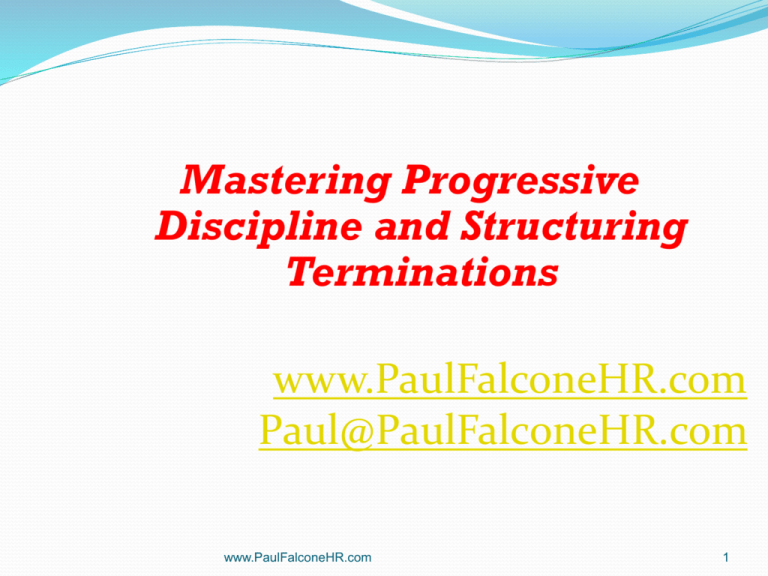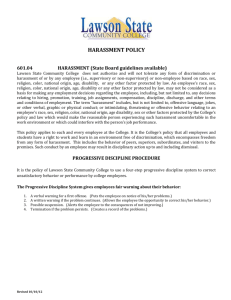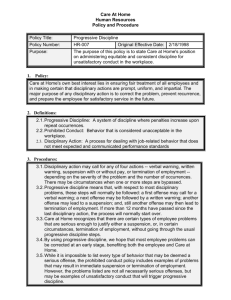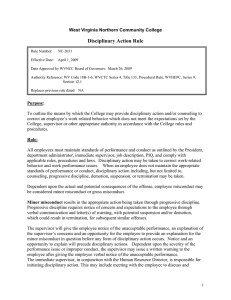this Powerpoint File
advertisement

Mastering Progressive Discipline and Structuring Terminations www.PaulFalconeHR.com Paul@PaulFalconeHR.com www.PaulFalconeHR.com 1 Contents Fundamental Elements of Workplace Due Process What is Progressive Discipline? Number of Steps Classifying Infractions www.PaulFalconeHR.com 2 Contents (cont.) Incident Description Dos and Don’ts Measurable and Tangible Improvement Goals Training and Special Direction to be Provided Documented Consequences “with Teeth” www.PaulFalconeHR.com 3 Contents (cont.) Watch What You Write: Avoid “Codifying the Damage” Avoid Documenting “State of Mind Offenses” Final Tips www.PaulFalconeHR.com 4 Fundamental Elements of Workplace Due Process Rule 1: The employee needs to know what the problem is Rule 2: The employee needs to know what she needs to do in order to fix the problem (a measurable standard must be known in advance) www.PaulFalconeHR.com 5 Fundamentals (continued) Rule 3: The employee needs to have a reasonable time period in which to fix the problem Rule 4: The employee needs to understand the consequences of inaction www.PaulFalconeHR.com 6 To meet these four criteria: You and your company have to be consistent in the application of your own rules. Therefore, look to your past practices. [Practice trumps policy!] The discipline must be appropriate for the offense. Beware of over emphasizing de minimis infractions. www.PaulFalconeHR.com 7 Fundamentals (continued) Consider prior service, overall performance, and prior performance appraisal and disciplinary records so that you’re not administering discipline in a vacuum. Ensure that you have a “clean final incident” before moving forward with termination. www.PaulFalconeHR.com 8 What is Progressive Discipline? A series of one or more formal (documented) notices that an employee’s performance and/or conduct doesn’t meet standards A progressive system of notification where each step contains some added element to impress upon the employee the growing sense of urgency www.PaulFalconeHR.com 9 Number of Steps Follow the verbal > written > final written warning paradigm unless starting with anything less than a final written warning could make you, as an employer, appear irresponsible. Accord more due to process to longer-term workers (via paid decision-making leaves or unpaid suspensions). www.PaulFalconeHR.com 10 Classifying Infractions A repeated violation of the same rule or the same type of rule is key to progressing through the steps of progressive discipline. Remember to view behavior in terms of overall responsibility rather than as isolated behavioral acts. www.PaulFalconeHR.com 11 Two Key Categories Performance Transgressions (including policy and procedure violations and attendance / tardiness) -Follow all regular steps of disciplinary process. Behavior/Conduct Infractions -- Move to immediate termination or a final written warning for a first offense, if necessary. www.PaulFalconeHR.com 12 I. Incident Description Do’s and Don’ts Rule 1: Employ the traditional who - what- where - when - why paradigm when drafting narratives Rule 2: Use your senses when describing events, and paint pictures with words www.PaulFalconeHR.com 13 Incident Descriptions (cont.) Rule 3: Document the negative organizational impact that resulted from the employee’s actions “I found inconsistencies throughout your calculations and had to correct them myself before they could be processed. As a result, . . . www.PaulFalconeHR.com 14 Incident Descriptions (cont.) I had to work until 10:00 PM last night We’ll have to hire a temp We’ll need to push back the go-live date.” Special Note: Don’t forget to attach the evidence (i.e., documented examples of the problematic work product, if available)! www.PaulFalconeHR.com 15 Incident Descriptions (cont.) Rule 4: Whenever possible, include the employee’s response in the warning to document that you listened to the individual’s side of the story before taking disciplinary action. “When I asked you how this occurred, you stated. . .” www.PaulFalconeHR.com 16 II. Measurable and Tangible Improvement Goals State your expectations clearly: “I expect you to complete your recruitment statistics by the fifth of the month and tell me in advance if you will be unable to collect the data from HRIS to meet this goal.” www.PaulFalconeHR.com 17 Measurable Goals (cont.) “You are expected to meet our organization’s guidelines regarding attendance and punctuality for the remainder of your introductory period and thereafter.” “I expect you to always treat your coworkers with respect and to foster an inclusive work environment.” www.PaulFalconeHR.com 18 III. Training and Special Direction to be Provided Whenever possible, address a problem with positive tools and encouragement in order to “meet the employee half way.” Discipline should always be delivered hand-in-hand with training and other “affirmative” employer efforts. www.PaulFalconeHR.com 19 Training (continued) “I will meet with you in your office every Monday for the next four weeks to . . .” “In an effort to sensitize you about how your behavior might impact others, please investigate one-day workshops on dealing with interpersonal conflict in the workplace, which you may attend on company time and at company expense.” www.PaulFalconeHR.com 20 Training (continued) We supported you through your FMLA leave of absence, which initially exhausted its 480hour maximum and expired on July 6th, 2013. You immediately requested an additional two weeks off for a personal leave of absence from August 24th – September 6th due to an illness in your family, which was likewise granted. Then as an ADA accommodation for modified duty, you were permitted to work in a restricted capacity from July 21st – December 14th. You ultimately received a full return-to-work release from your healthcare provider on Monday, December 14th. However, on Wednesday, December 16th, you stated that you slipped and fell and initiated a workers’ comp claim, which the company fully supported. (Note that we have since received medical documentation releasing you to return to full duty.) In addition, we agreed for you to work in an office location closer to your home one day per week to accommodate your longer commute. You are certainly entitled to these leaves, but the timing of the occurrences, your taking time off “at whim,” your failure to apprise management of your whereabouts or report back to duty as instructed, and your disregard for policy and protocol have now placed your position in immediate jeopardy of being lost. www.PaulFalconeHR.com 21 IV. Documented Consequences “with Teeth” Catch-All: “Failure to demonstrate immediate and sustained improvement may result in further disciplinary action up to and including dismissal.” www.PaulFalconeHR.com 22 Consequences (continued) Consequences with no time limits: “If you ever again engage in conduct with a supervisor, coworker, or customer that could be considered hostile or offensive, or threatening or overly challenging, you may be immediately dismissed.” www.PaulFalconeHR.com 23 A Short Illustration August 2013: Verbal Warning October 2013: Written Warning December 2013: Final Written Warning February 2014: Performance Review “meets expectations” April 2014: Department requests termination Question: Can you terminate safely? www.PaulFalconeHR.com 24 Watch What You Write. . . • Avoid using the words “always” and “never” in both your verbal and written communications. Avoid documenting “state of mind” offenses: do not use words such as “willfully, maliciously, purposely, deliberately, or intentionally” (mental element qualifiers) Do not “codify the damage.” Remember, these documents are all discoverable (e.g., “Sexual Harassment” is considered a legal conclusion). www.PaulFalconeHR.com 25 Final Tips (cont.) Don’t ever rush to judgment at the finish line: You’re better of placing an individual on a paid, investigatory leave when you need additional time to reach a conclusion. Don’t manage by fear of a lawsuit: Instead, make sure that if one comes your way, you’re getting sued on your terms, not theirs! Successful verbal and written interventions allow you to handle matters respectfully, responsibly, and in a timely manner, which are the key tenets of workplace due process and fairness. www.PaulFalconeHR.com 26 Q&A: Questions and Actions Paul Falcone www.PaulFalconeHR.com Paul@PaulFalconeHR.com www.PaulFalconeHR.com 27



